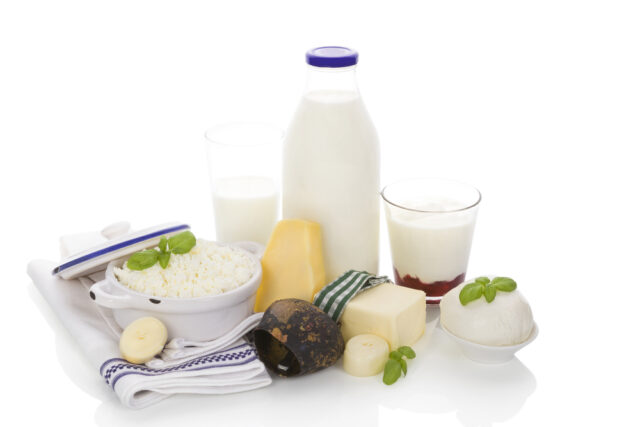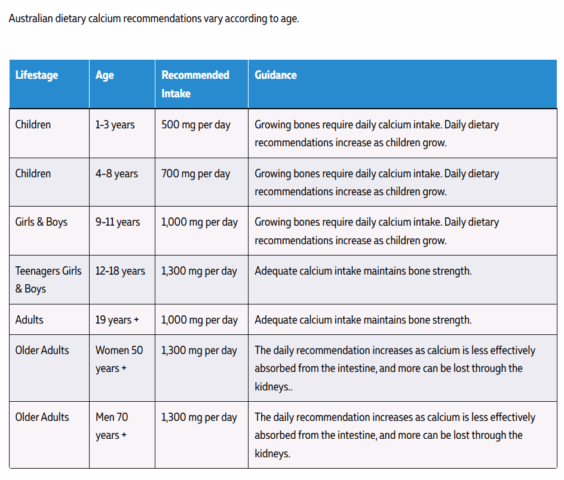Calcium and bone health
Calcium is the most important mineral for building and maintaining strong bones. About 99% of the body’s calcium is stored in the bones and teeth, where it plays a vital structural role. Adequate calcium intake throughout life is essential for reaching and maintaining peak bone mass, which helps reduce the risk of developing osteoporosis.
When dietary calcium intake is too low, the body compensates by drawing calcium from the bones to maintain necessary functions like muscle contraction and nerve signalling. Over time, this can weaken the bones and lead to low bone density (osteopenia) or osteoporosis. That’s why maintaining a steady intake of calcium, particularly in older age, is crucial to slow bone loss and reduce fracture risk.
Calcium in the diet
The best way to get the recommended level of calcium intake for your age is to eat a diet rich in calcium. Calcium content in food varies significantly, so it is important to consume ‘calcium rich’ foods. Dairy products such as milk, yoghurt, and cheese are the richest and most readily absorbed sources of calcium.
Recommended: 3-5 serves of calcium rich food daily (number of serves depends on the level of calcium in each food). For example: glass of milk (250 ml), tub of yoghurt (200 g), slice of cheese (40 g). Low fat options contain similar levels of calcium.
Download the Fact Sheet: Calcium Content of Common Foods printable information.
Other foods that contain calcium include leafy green vegetables (like bok choy, silverbeet and kale), broccoli, mustard cabbage, cucumber, celery, chick peas, tofu set with calcium, almonds, dried figs and dried apricots, and fortified foods such as calcium-enriched plant-based milks, breakfast cereals, and juices. However, many non-dairy sources provide smaller amounts of calcium per serve, and it can be more difficult to meet daily needs through these foods alone.

Calcium for people who avoid dairy
If you avoid, are allergic to, or intolerant of dairy products and are not taking a calcium supplement, you may have been calcium-deficient for some time. This increases your risk of developing osteoporosis, especially if other risk factors are also present. In these cases, your doctor or dietitian may recommend a calcium supplement to help you meet your daily needs, particularly if your dietary intake is consistently below recommended levels.
The most common supplements are calcium carbonate, calcium citrate or hydroxyapatite. Supplements may take the form of oral tablets (swallowed), effervescent tablets, chewable tablets or soluble powder. Calcium supplements are usually well tolerated and are sometimes combined with vitamin D supplements (as required). Take supplements as directed and talk to your doctor or pharmacist if you have any queries.
Calcium – do we absorb everything?
Not all the calcium we consume is absorbed. It is normal for a small amount of calcium to be lost and excreted. This is factored into the recommended intake for your age. However other factors can lead to an abnormally low level of calcium absorption and should be discussed with your doctor, for example:
- Low vitamin D levels,
- Excessive caffeine and alcohol,
- Diets high in phytates (e.g.: some cereals and brans) or oxalates (e.g.: spinach, rhubarb),
- Certain medical conditions (e.g.: coeliac disease, kidney disease),
- Certain medicines (e.g.: prednisone, prednisolone).
Calcium in osteoporosis management
For those already diagnosed with osteopenia or osteoporosis, ensuring adequate calcium intake is a key part of treatment and ongoing management. While calcium alone won’t stop or reverse bone loss, it works together with vitamin D and other therapies to support bone strength and reduce the risk of fractures.

Your doctor can advise on appropriate calcium supplements if dietary intake is insufficient. These are available in various forms, including tablets and chewables, and can be tailored to suit dietary restrictions and individual health needs.
Download the Fact Sheet: Calcium + Bone Health printable information.
Well-known examples are high calcium content meals include Greek Yogurt Parfait, Salmon with Broccoli, Spinach and Cheese Omelette, Cottage Cheese and Fruit Bowl, and the ever-popular Baked Cheesecake! Full recipes and variations can be found across many websites, including some as below on Healthy Bones Australia website:
Source and credit: Healthy Bones Australia, see link to Bone Healthy Recipes
